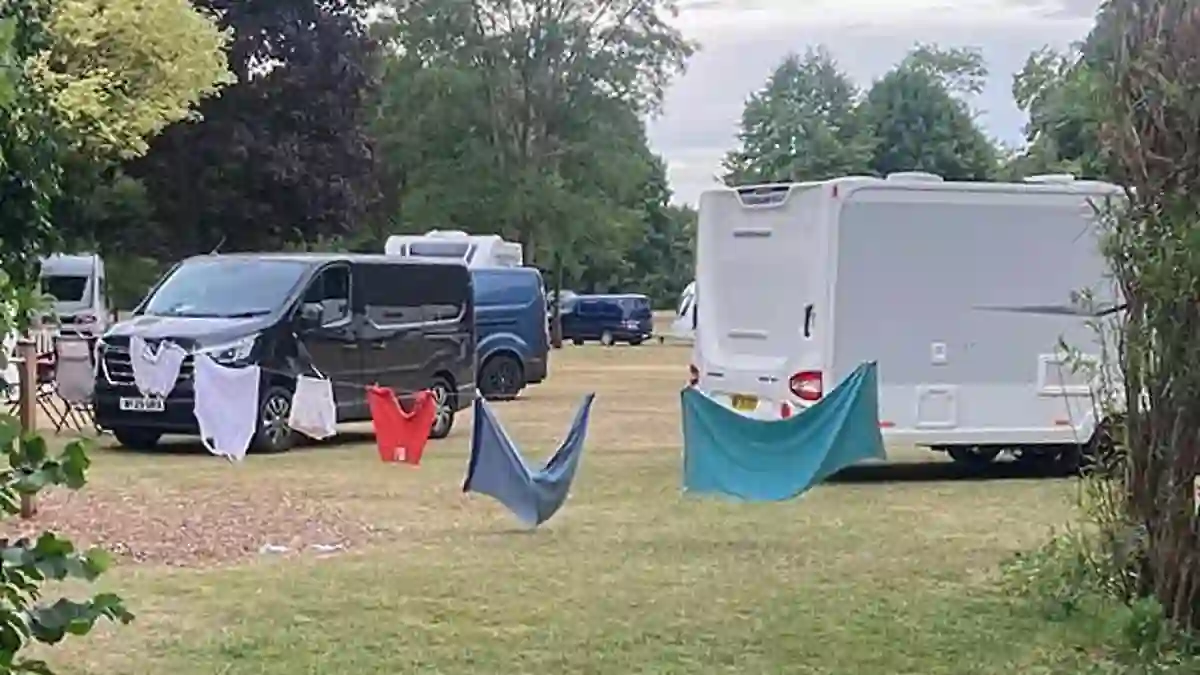In both Nottingham and Plymouth, public frustration has been growing after multiple groups of travellers set up unauthorised camps across car parks and playing fields.
Now, local councils and police forces have stepped in to take action — giving some groups just 24 hours to pack up and leave.
Overnight Arrival Sparks Concern in West Bridgford
In Nottingham, a convoy of around 60 vehicles rolled into the Nursery Car Park in West Bridgford on Monday night.
According to police, the group forced their way in by breaking through a gate, gaining access to public land that’s normally used by families, sports teams, and local events.
By Tuesday morning, Nottinghamshire Police had teamed up with Rushcliffe Borough Council to issue a Section 61 notice — a legal order demanding the group leave by midday or face enforcement action.
Rushcliffe Council Steps In After Community Complaints
Inspector Tim Cuthbert from the local neighbourhood police said the scale of the encampment caused a lot of concern in the area.
He confirmed that several vehicles had already left and added that enforcement would follow if the rest remained past the deadline.
Rushcliffe Borough Council also confirmed that the site is now being cleared and cleaned.
“We understand how important this park is to the community,” said Cuthbert.
“We acted quickly, and we’re grateful to the public for alerting us.”
Down South, Plymouth Deals With Multiple Camps in One Weekend
While Nottingham was tackling one large group, Plymouth had its hands full with multiple unauthorised camps popping up across the city.
Over the weekend alone, three separate encampments were reported — at Prince Rock Playing Fields, Stonehouse Creek, and Knowle Battery.
The council confirmed that they had provided toilets and bins as legally required, but issued 24-hour Notices to Quit to limit the disruption for residents.
One group initially appeared at a site next to the Plymouth Albion rugby pitch — land earmarked for a new Plymouth Argyle academy — before moving to another public space by Sunday.
Dealing With the Aftermath
These incidents aren’t just about people turning up and parking on grass.
In 2023, Plymouth City Council had to fork out £7,000 to clean up waste left behind at Prince Rock Playing Field — including piles of what appeared to be hazardous materials like asbestos.
Videos shared by residents showed shocking mounds of rubbish dumped across the grass, prompting the council to bring in specialist contractors to deal with the mess.
Legal Tools and Limits
In cases where the land is owned by the council, authorities can issue a Notice to Quit, giving travellers 48 hours to vacate the area.
If they don’t leave, the council can go to court to get a possession order, which bailiffs then enforce.
If the land is privately owned, the process becomes the landowner’s responsibility.
Police can only step in using powers under the Criminal Justice and Public Order Act 1994 if there are “aggravating factors” — such as crime, disorder, or antisocial behaviour.
That’s exactly what happened in June 2021, when Plymouth police used this power for the first time to move a group from St Mary’s Playing Field.
A Long-Running Challenge With No Easy Fix
This isn’t a new issue. Back in 2011, Plymouth Council had plans to create three permanent sites for Gypsy, Roma, and Traveller communities — including in St Budeaux, Efford, and Roborough.
But by 2014, those plans were dropped after local opposition and concerns over cost, even with public subsidies.
Council officials admit that the lack of proper, designated locations for temporary stops continues to fuel the problem.
A spokesperson said:
“These unauthorised encampments aren’t helping anyone.
They upset residents, cost the council money, and don’t offer proper facilities for the GRT community.”
Hopes for Temporary Stopping Sites
One long-term solution on the table is the idea of Temporary Stopping Sites (TSS) — designated areas where travelling groups can legally stay for short periods.
If set up, these sites would also give police clearer authority to move groups on from unauthorised land and direct them to approved locations.
But the council says it’s struggled to find locations that work for both local communities and the travelling groups themselves.
The idea hasn’t been dropped — but it’s stuck in limbo for now.
What Happens Next?
In Nottingham, the situation appears to be under control for now, with most of the vehicles already gone.
In Plymouth, the process of eviction continues, with one group awaiting a court hearing for a possession order.
Both cities — like many others across the UK — are stuck balancing public frustration, legal obligations, and the basic rights of travelling communities.
Until more designated sites are available, it’s likely this cycle will repeat itself again and again.



